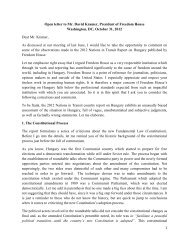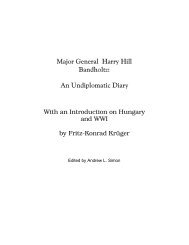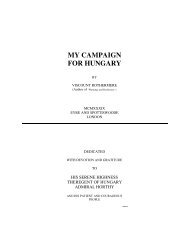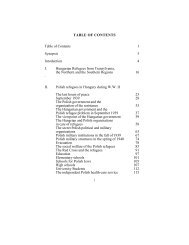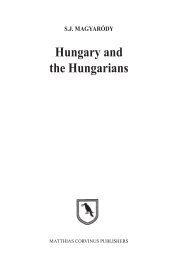The Fate of Western Hungary 1918-1921 - Corvinus Library ...
The Fate of Western Hungary 1918-1921 - Corvinus Library ...
The Fate of Western Hungary 1918-1921 - Corvinus Library ...
Create successful ePaper yourself
Turn your PDF publications into a flip-book with our unique Google optimized e-Paper software.
ecognized Austria’s independence and Austria <strong>Hungary</strong>’s without raising<br />
the border issue at all?”<br />
Wilson: “I repeat, I have been informed that the problem has been raised by<br />
the Austrian side.”<br />
A long debate started after the president’s final comment, at the end <strong>of</strong><br />
which they finally agreed to the following: “Austria is urged to recognize the<br />
border in existence since 1869 (actually 1867—J.B.) between it and <strong>Hungary</strong><br />
and, if any disagreement arises over it between the two countries, then the<br />
Allied and Associated Powers will address the question, as needed.” 183<br />
As is now known, the “any disagreement arising” was eventually raised to<br />
such a level that border “adjustment” was required in the western area <strong>of</strong><br />
<strong>Hungary</strong>. Davis Hunter Miller did not record how all this came to pass or later,<br />
how the victors were forced to redress somewhat the injustices performed by<br />
the Sopron plebiscite. He only recorded that the recommendation <strong>of</strong> the four<br />
border adjustment committees (<strong>The</strong> Czechs, Romanians, South Slavs and<br />
Austrians) was unanimously accepted by the Council <strong>of</strong> Foreign Ministers. In<br />
the end, the notes and memoranda submitted by the Hungarian peace<br />
delegation, which rebutted with facts and figures the deluge <strong>of</strong> border claims<br />
based on false and skewed facts, the decision makers did not even deign to<br />
read. <strong>Hungary</strong>’s new borders were submitted to a full session <strong>of</strong> the highest<br />
body <strong>of</strong> the peace conference as the decision <strong>of</strong> the Entente’s foreign ministers<br />
for the purpose <strong>of</strong> entering the terms into the future treaty with <strong>Hungary</strong>. Before<br />
it was done, however, perhaps to assuage their consciences, British Prime<br />
Minister David Lloyd George expressed an interest at the last minute how<br />
Austria and <strong>Hungary</strong> may be ensured free access to the seas, which their<br />
artificial borders precluded. <strong>The</strong> suggestion was supported by Italian prime<br />
Minister Orlando and US President Wilson, who wished to ‘guarantee’ for both<br />
countries possibilities and protection in this regard. A four-member<br />
subcommittee was formed (the 179 th <strong>of</strong> the peace conference) which, in<br />
cooperation with the sub-committee <strong>of</strong> ports, waterways and railway matters,<br />
attempted to create, on paper, sea access for the two countries. After amicable<br />
discussion, they were unable to ensure ‘guaranteed’ access to a sea for either<br />
<strong>Hungary</strong> or Austria.<br />
Hungarian public opinion and the highest levels <strong>of</strong> government were deeply<br />
disturbed by the unrestrained behavior <strong>of</strong> their former ally and partner country.<br />
Sensing this, the Austrian government – while the Hungarian delegation<br />
continued to dispute Austria’s claims to <strong>Western</strong> <strong>Hungary</strong> – looked for support<br />
to strengthen its foreign policy subsequent to the Saint-Germain treaty.<br />
Chancellor Renner and Foreign Minister Beneš signed a secret agreement on<br />
January 12, 1920 in Prague. <strong>The</strong> agreement stipulated that, in the case <strong>of</strong> an<br />
attack on either country, mutual assistance – including military – was to be<br />
extended to the other. <strong>The</strong> agreement also <strong>of</strong>fered assurances to Austria in<br />
recognizing its right to Westungarn. <strong>The</strong> Hungarian paper, Az Újság, printed<br />
183 Ibid, pp. 35-36.<br />
80




